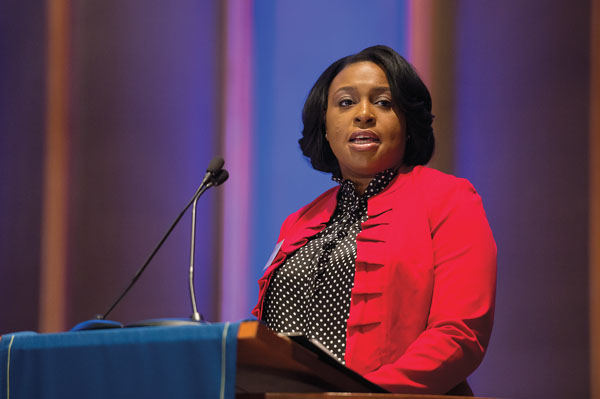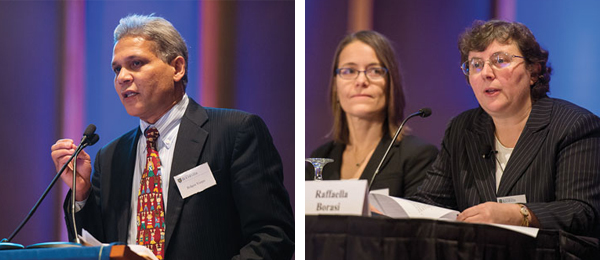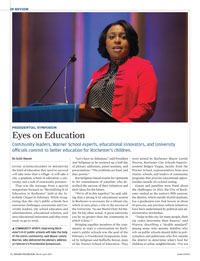In Review
 COMMUNITY SPIRIT: Improving Roch-ester’s K-12 public schools will take the help of the entire community, said Mayor Lovely Warren, who delivered the plenary address at February’s Presidential Symposium. (Photo: Adam Fenster)
COMMUNITY SPIRIT: Improving Roch-ester’s K-12 public schools will take the help of the entire community, said Mayor Lovely Warren, who delivered the plenary address at February’s Presidential Symposium. (Photo: Adam Fenster)Giving schoolchildren in Rochester the kind of education they need to succeed will take more than a village—it will take a city, a graduate school of education, a university, and a web of community partners.
That was the message from a special symposium focused on “Revitalizing K-12 Education in Rochester” held at the Interfaith Chapel in February. While recognizing that the city’s public schools face enormous challenges, community and University leaders, city school educators and administrators, educational scholars, and area educational innovators said they were ready to get to work.
“Let’s have no delusions,” said President Joel Seligman as he summed up a half day of plenary addresses, panel sessions, and presentations. “The problems are hard, and they persist.”
But Seligman found reason for optimism in the commitment of panelists who described the success of their initiatives and their ideas for the future.
“We’re all in this together,” he said, adding that a strong K-12 educational system in Rochester is necessary for a vibrant city, which in turn plays a role in the success of the University. “As our Board Chair Ed Hajim ’58 has often noted, ‘A great university can be no greater than the community in which it lives.’ ”
Bringing together members of the community to start a conversation on Rochester’s public schools was the goal of the February 4 Presidential Symposium, hosted by Seligman and Raffaella Borasi, dean of the Warner School of Education. They were joined by Rochester Mayor Lovely Warren, Rochester City Schools Superintendent Bolgen Vargas, faculty from the Warner School, representatives from area charter schools, and leaders of community programs that provide educational opportunities outside of a school setting.
 IDEAS: Superintendent Bolgen Vargas, Warner Professor Kara Finnegan, and Dean Raffaella Borasi offered ideas about K–12 education. (Photo: Adam Fenster)
IDEAS: Superintendent Bolgen Vargas, Warner Professor Kara Finnegan, and Dean Raffaella Borasi offered ideas about K–12 education. (Photo: Adam Fenster)Guests and panelists were frank about the challenges: in 2013, the City of Rochester ranked as the nation’s fifth poorest; the district, which enrolls 30,000 students, has a graduation rate that hovers at about 43 percent; and previous reform initiatives have been undermined by political and administrative skirmishes.
“Today in this city, for many people, their zip codes determine their futures,” said Warren, describing a “double standard” among some who assume families who rely on public schools should defer to policymakers and politicians who live outside the district to determine what’s best for children in urban neighborhoods. “I’m not naive. Chipping away at the double standard of public education will be hard work.”
She said one of her main initiatives in her first term as mayor will be to increase the availability of pre-kindergarten programs, noting that state and national leaders have also recognized the importance of early learning in improving K-12 education. She also emphasized that children in the city have fewer opportunities to take part in summer learning programs, which means their chances of “sliding” educationally during the summer are far greater than for other children.
Vargas echoed those themes, saying that expanding pre-kindergarten programs, providing more summer learning initiatives, and expanding enrichment programs are among the key elements in a strategy to improve educational outcomes for the district. “I’m very pleased with the conversation that we’re having today,” he said.
Borasi said the Warner School and the University have deep ties to the city’s schools and their students, providing professional development opportunities, developing after-school programs, initiating summer learning opportunities, educating teachers, and conducting research on urban education.
“We really want to be part of the conversation,” Borasi said. “We are a major part of the community, and K-12 education is a responsibility of the entire community.
“Over time, we have added concrete initiatives that we undertake in the community. And we continue to look for new opportunities where we can use our resources best. We can’t do it all, but there are specific things where we can try to make a difference.”
Seligman said that the University has a track record of supporting K-12 education in Rochester, noting that the Warner School has received nearly $20 million to support education reform in the Rochester area and western New York. In addition, the University commits $1.7 million each year in scholarships to graduates of Rochester schools, supports low-income students as they prepare for college through the University’s Upward Bound program, and works with programs at Rochester high schools. He also noted the success of programs such as the Hillside Work-Scholarship Connection, which provides education and training to middle and high school students, and said the University plans to increase its participation in the program from 120 to 275 students.
“When many universities have scaled back their support of schools of education, the University of Rochester is determined to invest in K-12 education as part of our commitment to the greater Rochester community and, most of all, its children,” Seligman said.
Acknowledging that the issues facing public education in Rochester are too large to solve quickly, he asked that the symposium reconvene in early 2015 to assess progress and map out new areas for discussion.
Warren said she looked forward to an ongoing conversation with the University on education and a range of issues, noting the role that the University plays in the region as the area’s leading employer.
“I think it’s important that we all come together to move our community forward in a way that’s realistic to the residents of our City of Rochester but also to our region,” she said. “The fact is that the University is the number one employer in our region. That’s not just the Mt. Hope area, but throughout the City of Rochester. It’s very important. Those relationships—in research, in education, in the businesses that have been developed around what’s happening at the University—are very important as we move forward.”

